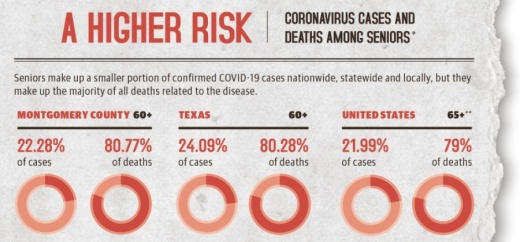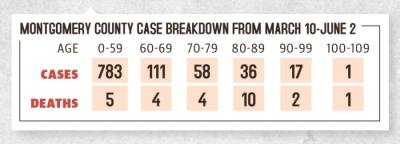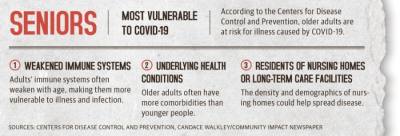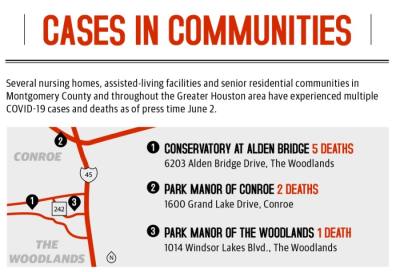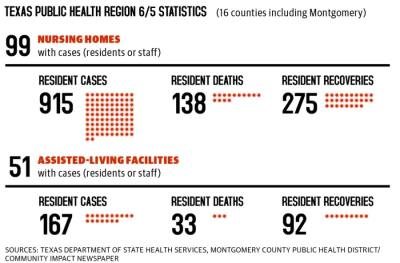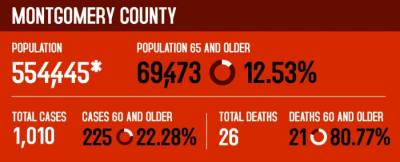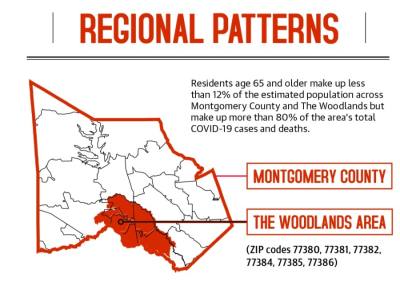The Centers for Disease Control and Prevention has advised that COVID-19 disproportionately affects older adults. That guidance has led local seniors to limit their public interactions as deaths and complications from the disease have risen.
In Montgomery County, 80.77% of the 26 total deaths from the disease have been reported in those ages 60 and older as of June 2, despite that population making up around 22.28% of the county’s 1,010 total cases.
The higher death rate among seniors, who make up an estimated 12.5% of county residents as of 2018, according to the U.S. Census Bureau, has led many facilities to make changes to stop the spread of the virus.
“People my age—and almost everybody I deal with is older, over 55 anyway, with the exception of some grandchildren—[are] just becoming more and more cautious in what they do,” said Bruce Cunningham, a board member of the Grogan’s Mill Village Association.
A vulnerable population
Concerns for seniors stem from changes to their immune systems and from the higher likelihood of underlying conditions, said Dr. Candace Walkley, an assistant professor of internal medicine and pediatrics at Sam Houston State University.
“Some of the reasons why the elderly are more vulnerable is because they’re more vulnerable to everything in general,” Walkley said. “If they get the common cold or if they get influenza or if they get food poisoning, they are just at higher risk.”
As of June 2, around 79% of the 105,157 deaths related to COVID-19 in the U.S.—more than 80,000—were reported in those age 65 and older, according to the CDC. Those age 75 and older have accounted for around 58% of the country’s total deaths related to COVID-19. In Texas, 350 of the state’s 492 deaths related to the virus—or 71.14%—reported were among those 65 and older, according to the Texas Department of State Health Services.
In addition to individual health risks, many seniors’ vulnerability to the virus has increased due to its potential for circulation in places such as nursing homes and residential retirement communities. While such facilities were already required to have some infection control practices in place for staff and residents for situations such as a flu outbreak, the rapid and often undetected spread of COVID-19 posed a new challenge for senior living or nursing centers, Walkley said.
Gov. Greg Abbott banned all visits to nursing homes in Texas on March 19, and as of press time June 2 they remained closed to members of the public, including residents’ friends and family members.
“The facilities have been on lockdown since mid-March, but they still don’t live in a bubble,” said Lisa Hayes, managing local ombudsman for the Houston-Galveston Area Agency on Aging. “We’re still getting new cases and outbreaks every week because [residents] require staff to take care of them.”
Senior living, care center responses
Viral spread at several senior living facilities in Montgomery County resulted in the deaths of several residents this spring. Two residents of the Conservatory at Alden Bridge in The Woodlands were reported as the county’s first deaths related to COVID-19 on April 1, and three additional deaths were reported later that month.
Two other county nursing homes, Park Manor of The Woodlands and Park Manor of Conroe, reported a combined 21 cases among residents and staff April 23, according to the Montgomery County Public Health District. One resident at The Woodlands home and two residents at the Conroe home have been reported to have died from the disease as of press time.
In response to reports of senior centers throughout the state experiencing breakouts of the virus, Abbott ordered testing of all staff and residents at every nursing home in the state May 11—although residential or assisted-living communities were not included. The Woodlands Fire Chief Palmer Buck said his department and a county task force carried out more than 500 tests at two The Woodlands nursing homes the week of May 18.
Hayes said she believes many of the facilities she works with have responded adequately based on available information about the virus and increased sanitation, isolation and testing practices. Still, she said increased isolation due to practices aimed at slowing the virus may have negative effects both on residents’ health and on the ability to assess seniors’ living situations.
“For them it’s helpful to have another set of eyes at the facility to see what’s going on with their care and their quality of life,” she said. “It’s frustrating for us. We know they need to be protected from the virus, and we support that, but we often see a lot of things when we’re physically in the building that we work to get resolved.”
Lori Alford, the chief operating officer of Avanti Senior Living, said every Avanti location—including two in The Woodlands area—has remained free of COVID-19 as of press time. She credited an increase in sanitation, resident isolation and visitor restrictions for the facilities’ success.
“Just because there was COVID in a building doesn’t make that a bad place to go because quite honestly there’s a lot more communities out there that didn’t have COVID or maybe had very few cases,” she said. “We care for thousands and thousands of seniors, and there’s a lot more seniors that are safe than there are that were harmed during this crisis.”
John Googer, executive director of the Conservatory, said new sanitary protocols and screenings have been in effect at the facility since early March.
“We are still delivering all meals to individual apartments [and] have limited small group gatherings limited to 10 and socially distanced,” he said. “We ... are working with the Montgomery County Health District to safety introduce a gradual reopening plan for our residents.”
Community ties
Hayes said there is a gulf between some nursing home residents and their friends and families who cannot communicate on a regular basis.
However, Alford said Avanti has worked to keep its residents connected with one another and their families through technology and community engagement.
“This time is hard for everybody,” Alford said. “What we do know is humans are resilient, and our residents understand. ... They know that they’re a vulnerable population to the virus, so they’re very understanding.”
On May 27, Abbott announced a $3.6 million Texas Health and Human Services Commission initiative to provide electronic communication devices to nursing home residents. Senior facilities will each receive up to $3,000 for the purchase of items such as tablets, webcams and headphones, according to a release from Abbott’s office.
Other local services for seniors have also been affected by the pandemic. Summer Day, the president and CEO of Meals on Wheels Montgomery County, said daily meal deliveries and congregate dining have been cut to weekly offerings, while transportation is limited to single-rider trips for medically necessary appointments.
Day said she believes the changes implemented by Meals on Wheels may have affected many clients’ social connections.
“The daily meal delivery is the highlight in most of our clients’ day,” Day said. “It is the one time they get to interact with the outside world. The switch to weekly delivery has been another setback for the already lonely population.”
In Grogans Mill, Cunningham said his interactions with friends and neighbors are now limited to virtual conversations and socially distanced meetings on his block. He said many older residents are displeased with other community members who are not wearing CDC-recommended face coverings in public.
Cunningham said the response to the virus will likely keep him more health conscious, and the outbreak has affected his outlook on nursing homes going forward.
“I think I’ll probably wear a face mask for the rest of my life,” he said. “And I certainly don’t want to go into a nursing home at this point in time.”
Walkley said the increased attention on nursing homes and assisted-living facilities may lead some seniors and family members to reconsider their plans or wishes for end-of-life care and housing.
“I would personally hope to see people have more priority for their advanced directives and their living wills so that we’re not necessarily a nation with a bunch of nursing homes full of elderly people who are disconnected from their families, who do not necessarily make plans for themselves,” she said.




